
Internet marketing is a broad term that encompasses a wide range of strategies aimed at promoting a company and its products using online tools. The main goals are attracting potential customers, increasing website traffic, and boosting sales.
Before the active development of internet marketing channels, the costs of promoting goods or services in the market were often excessively high and difficult to measure. For example, determining brand recognition levels through consumer focus groups was quite labor-intensive. Today, almost every company can develop its online business, optimize it, forecast campaign effectiveness, and calculate return on investment.
Understanding what internet marketing is, it's important to realize that it's constantly evolving. Just a few years ago, its arsenal included website promotion, email campaigns, and online advertising.
Today, promoting a business online is inconceivable without video, blogs, social media targeting, and a plethora of other tools.
Unlike offline promotion channels, internet marketing provides exceptional opportunities to accurately assess the impact of any tool, analyze how visitors interact with the website or landing page, and draw conclusions on how to better engage potential customers. We've already discussed how internet marketing effectiveness is measured.
Analytics for websites and mobile applications help determine which channels are the most profitable and which user groups demonstrate activity and loyalty towards the brand.
Round-the-Clock Online Business Operation: When all processes are automated, customers can place orders at any time of the day, and entrepreneurs do not need to worry about overtime pay for their employees.
Personalized Approach to Advertising: There is an opportunity to make offers that accurately reflect the interests of potential customers.
Prospects for Establishing Long-Term Customer Relationships: Using various techniques (remarketing, email campaigns), it's possible to retain the attention of customers over an extended period.
While these terms have some similarities, there are key differences that need to be considered in building a marketing strategy.
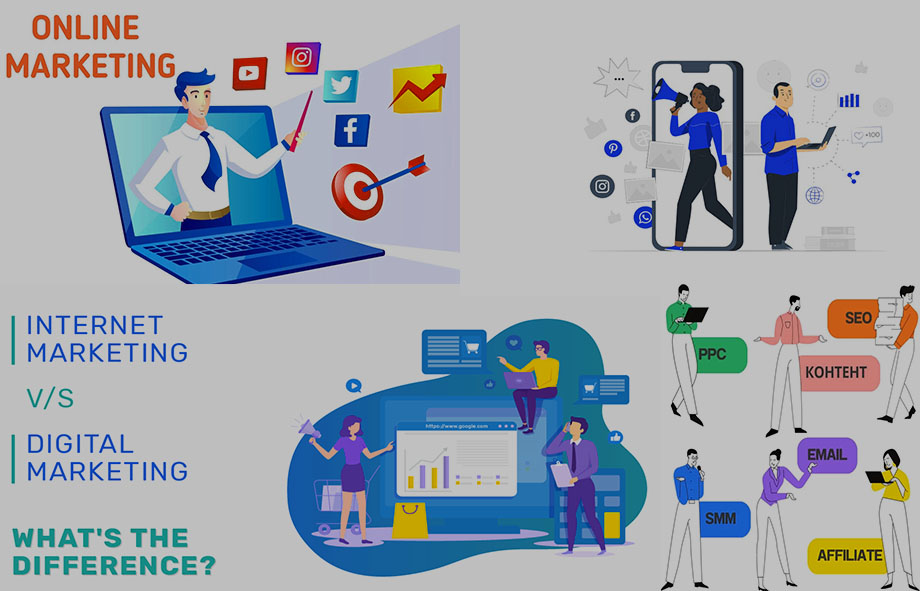
Digital marketing is a broad term that encompasses everything requiring the use of electronic devices, including internet marketing (also known as online marketing). The digital marketing market is growing overall with the dominance of digital platforms in the 21st century, replacing the traditional approach.
The main differences between digital and online marketing services lie in the technical characteristics. The term digital marketing is used for strategies in which digital formats (e.g., television advertising) are used to promote products and services. This means that promotion through this method is not limited to the internet alone. For more details on the specifics of digital marketing, you can read in our other article.
Internet marketing falls within the realm of digital marketing and involves a presence on the internet. Online marketing services use digital channels and are exclusively provided on the web. To convey your message to the target audience, you need to focus, for example, on using advertising on social media.
Utilizing the benefits of this marketing channel, it is entirely possible to create a comprehensive online marketing strategy, refine existing goals, and increase return on investment. Let's take a closer look at modern web marketing and specify what tools are available for use.
Content Marketing
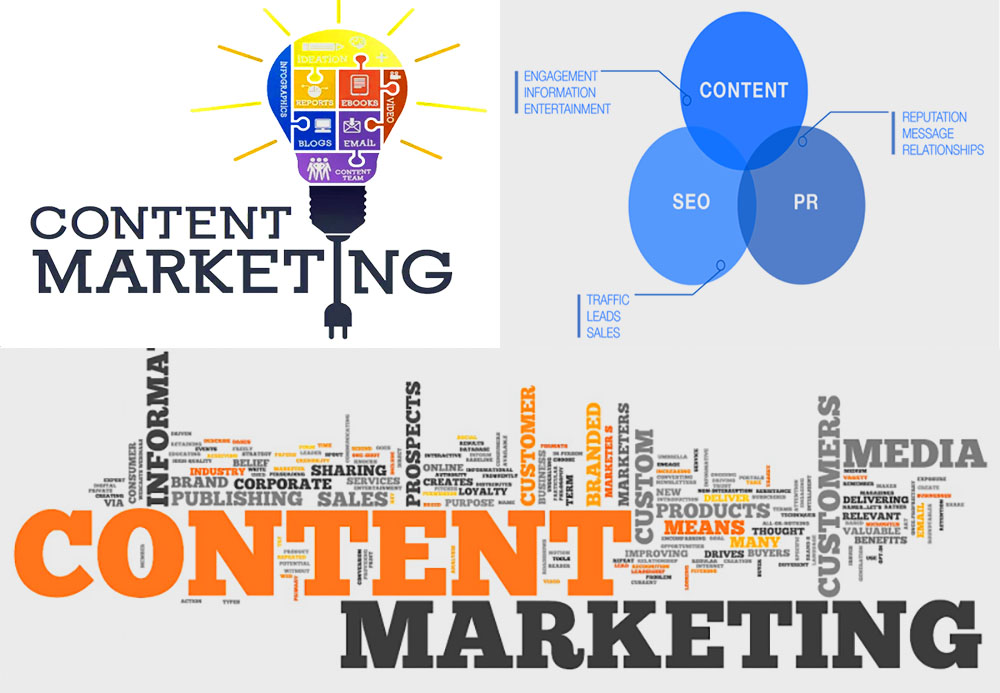
Content marketing strategy focuses on sharing valuable and relevant knowledge with the audience. With high-quality and up-to-date content, you can attract attention to your brand and your company as a whole.
Today, information can be presented in various forms:
It's important to remember that content marketing is an excellent tool for anyone aiming for stability and striving to develop their business. For this channel to yield the best results, the materials must be of high quality, meaning they should be:
Of course, you need to take care of your reputation and remember about professionalism. Only then will internet marketing be successful.
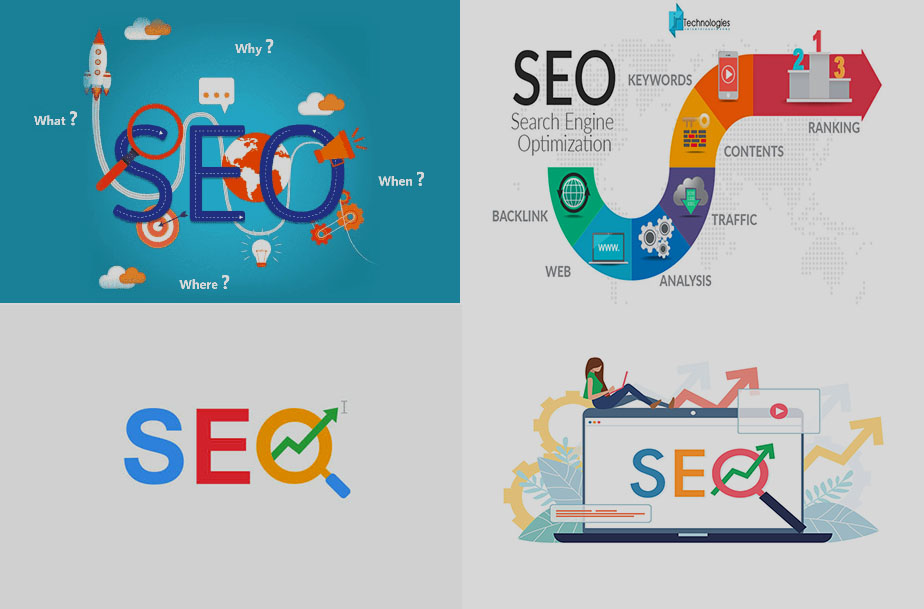
Search Engine Optimization (SEO) is the process of optimizing a website to rank higher in search engine results. The strategy helps the website to appear on the first pages of search engines, allowing for better quality traffic to the site.
What can improve a website's performance? Our company, as an expert in this field, recommends paying attention to the following features of modern SEO marketing:
Content Indexing: It's important for search engines to clearly "read" the content of the site. Texts should be added to images and there should be text transcriptions for video and audio content on the pages.
Internal Website Optimization: It's important for search engines to be able to scan the website's structure. Additionally, an SEO specialist needs to configure interlinking, create proper URLs, and update the sitemap to make it more accessible to search engine bots.
Keywords: Proper use of keywords in the text and headings is one of the fundamental building blocks of SEO. It is not recommended to stuff your content with as many keywords as possible. Writing high-quality content, where the main keywords are used in headings and a few times in the scan-accessible content of the page, is now considered best practice and enhances the page's ranking in search results.
It's important to understand that there are complexities in SEO. This includes regularly updating algorithms. When choosing search engine optimization as the primary tool for promotion, it's crucial to always keep up with all the changes in the search engine. Utilizing modern approaches will make internet marketing successful for your company.
Online advertising typically includes paid search and display ads. Most often, this tool operates on a pay-per-click (PPC) basis (companies pay for advertising only when users click on it).
Some of the main advantages of PPC advertising are:
Non-Intrusiveness: Compared to banners and direct sales, people perceive contextual and display ads more calmly.
Cost-Effectiveness: Payment is based on results, allowing a company to regulate the amount they are willing to spend on paid promotion.
Adaptability: In the settings of an advertising campaign, you can choose the promotion region, audience, socio-demographic characteristics, interests, etc.
Displaying ads at the top of search results, in the right part of the results page, during the viewing of partner websites on Google, before YouTube videos, and in mobile apps opens up extensive opportunities to increase brand awareness.
Internet marketing utilizes the advantages of pay-per-click (PPC) advertising as one of the best strategies for quickly attracting traffic to a website at a low cost. With the help of contextual advertising, it's easy to secure high positions in search results. However, it's important to be prepared for a decrease in traffic if funding is discontinued.
Online marketing is primarily about exchanging information with your customers, and social media platforms play a crucial role in facilitating this exchange. Promotion on these platforms goes beyond merely creating posts and responding to comments. For the impact on the audience to be effective, actions need to be coordinated and consistent.
Social media marketing allows businesses to make a positive impression on users and build trust with them. When companies engage interactively, share new content, comment, and engage in dialogue on social media, it humanizes the brand. People prefer dealing with other people rather than "faceless" companies. Practice shows that the time spent on developing relationships with consumers pays off through sales.
Key to SMM (Social Media Marketing) is analytics. Marketers on social media analyze the effectiveness of posts and create strategies based on this data. Expert advice on SMM marketing from our specialists will be valuable to you.
Year after year, we observe more and more companies establishing relationships and launching affiliate programs to grow their businesses. There are several reasons why many consider affiliate marketing to be an effective tool:
Market Expansion Without Advertising Costs: Firstly, it's a way to enter a new market and attract users without advertising expenses.
Cost-Effectiveness: Secondly, it's one of the most profitable marketing channels. Often, the partners helping to promote the brand are industry experts who use the products themselves. Thus, they bring in high-quality traffic, leading to increased conversion rates.
Brand Presence Enhancement: Thirdly, partners are an excellent source for enhancing brand presence on various platforms since they create diverse content (texts, videos, podcasts, and more).
All of this explains the growing popularity of affiliate marketing.
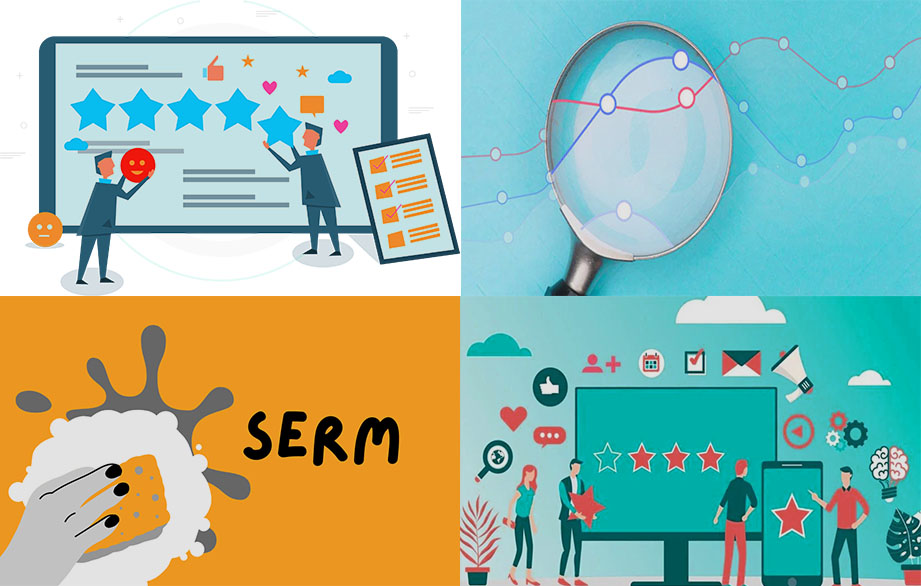
SERM, or Search Engine Reputation Management, is a promotional tool aimed at creating a positive reputation for a brand, company, or individual on the internet. The state of one's reputation directly influences online businesses, potential customers, and sales. The SERM method involves:
Review Management: Users sometimes leave negative reviews about everything. Not everyone knows how to notice and appreciate the good in products or services. It's important to showcase the best aspects of a person, brand, or business to the audience.
Creating Positive Publications on Authoritative Resources: This involves generating positive content on reputable platforms such as news portals, industry forums, and thematic websites.
Reputation is not just about honor or prestige. The higher the level of reputation, the more profit increases. A high rating, positive recommendations, and satisfied customers form the basis for trust in a company. This is when the goal of internet marketing is achieved more rapidly.
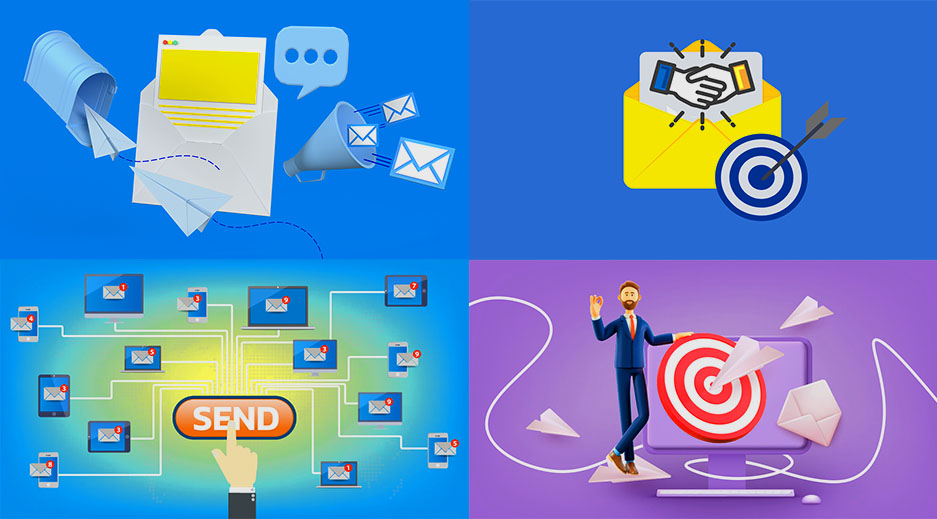
This tool allows for one-on-one communication with potential customers. While there is a common belief that email campaigns are not as popular anymore, they can still serve a good purpose for a company. Email marketing is best utilized when:
New Content is Published on the Website: It can encourage the audience to engage with the brand.
Users Have Abandoned Their Shopping Carts for Some Reason: You can remind them of the selected products. The likelihood of people making purchases increases.
Birthdays Are Approaching: Discounts and individually sent coupons are excellent to encourage audience conversion.
What is internet marketing? It is a system of activities aimed at increasing a company's presence on the World Wide Web. The main objectives of such actions are to organize the sales of products and services online and enhance brand recognition. This involves using online channels to interact with consumers, original strategies, and specialized services for analytics collection and targeting adjustments.
How do I start learning internet marketing? It's entirely possible to independently grasp the basics of internet marketing. Practical experience is highly valued today, shared by experts in web promotion through their blogs, educational videos, online courses, and webinars.
What does internet marketing consist of? The main tools of online promotion are referred to as search engine optimization, social media marketing, pay-per-click advertising, including contextual and other types of PPC advertising, content marketing, and email campaigns. These and other forms of internet marketing help achieve customer engagement and enable swift responses to market changes.
Custom-Tailored Strategies
Proactive Adaptability
Innovative Ad Formats


